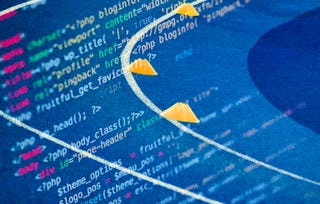This course provides an introduction to using Python to analyze team performance in sports. Learners will discover a variety of techniques that can be used to represent sports data and how to extract narratives based on these analytical techniques. The main focus of the introduction will be on the use of regression analysis to analyze team and player performance data, using examples drawn from the National Football League (NFL), the National Basketball Association (NBA), the National Hockey League (NHL), the English Premier LEague (EPL, soccer) and the Indian Premier League (IPL, cricket).

Foundations of Sports Analytics: Data, Representation, and Models in Sports

Foundations of Sports Analytics: Data, Representation, and Models in Sports
This course is part of Sports Performance Analytics Specialization


Instructors: Wenche Wang
28,042 already enrolled
Included with
203 reviews
Recommended experience
What you'll learn
Use Python to analyze team performance in sports.
Become a producer of sports analytics rather than a consumer.
Skills you'll gain
- Descriptive Statistics
- Statistical Hypothesis Testing
- Statistical Methods
- Correlation Analysis
- Matplotlib
- Data Visualization
- Statistical Analysis
- Pandas (Python Package)
- Regression Analysis
- Python Programming
- Scatter Plots
- Data Preprocessing
- Data Cleansing
- Data Analysis
- Plot (Graphics)
- R Programming
- Skills section collapsed. Showing 8 of 16 skills.
Details to know

Add to your LinkedIn profile
13 assignments
See how employees at top companies are mastering in-demand skills

Build your subject-matter expertise
- Learn new concepts from industry experts
- Gain a foundational understanding of a subject or tool
- Develop job-relevant skills with hands-on projects
- Earn a shareable career certificate

There are 6 modules in this course
This week introduces a simple example of sports analytics in practice - the calculation of the Pythagorean expectation to model winning in team sports. This can also be used for the purposes of prediction. Examples are developed for five different sports leagues, Major League Baseball (MLB), the National Basketball Association (NBA), the National Hockey League (NHL), the English Premier League (EPL-soccer) and the Indian Premier League (IPL-cricket).
What's included
8 videos6 readings1 assignment7 ungraded labs
This week will use NBA data to introduce basic and important Python codes to conduct data cleaning and data preparation. This week also discusses summary and descriptive analyses with statistics and graphs to understand the distribution of data, the characteristics and pattern of variables as well as the relationship between two variables. At the end of this week, we will introduce correlation coefficients to summarize the linear relationship between two variables.
What's included
6 videos6 readings3 assignments5 ungraded labs
This module introduces some ways of representing data using examples from MLB, the NBA and Indian Premier League. MLB data is used to analyze the spatial distribution of different hits. NBA data is used to generate heatmaps to illustrate the different ways in which players contribute. IPL data is used to show how team performances can be compared graphically.
What's included
4 videos6 readings2 assignments5 ungraded labs
This week introduces the fundamentals of regression analysis. We will discuss how to perform regression analysis using Python and how to interpret regression output. We will use NHL data to estimate multiple regression models to identify the team level performance factors that affect the team's winning percentage. We will also use cricket data from the Indian Premier League to run regression analyses to examine whether player performance impacts player salary.
What's included
6 videos6 readings3 assignments4 ungraded labs
This module uses regression analysis to investigate the relationship between team salary spending and team performance in the NBA, NHL, EPL and IPL. The module explores different ways of defining the regression model, and how to interpret competing regression model results.
What's included
4 videos4 readings1 assignment5 ungraded labs
This week studies an interesting topic in sport, the hot hand. We will introduce the concept of hot hand and discuss the academic research that examines whether the hot hand is a phenomenon or a fallacy. We will demonstrate how to analytically test the hot hand using the NBA shot log data. We will test whether NBA players have hot hand by computing conditional probabilities and autocorrelation coefficients as well as performing regression analyses.
What's included
8 videos7 readings3 assignments5 ungraded labs
Earn a career certificate
Add this credential to your LinkedIn profile, resume, or CV. Share it on social media and in your performance review.
Instructors


Offered by
Explore more from Data Analysis
 Status: Free Trial
Status: Free TrialUniversity of Michigan
 Status: Free Trial
Status: Free TrialUniversity of Michigan
 Status: Free Trial
Status: Free TrialUniversity of Michigan
 Status: Free Trial
Status: Free TrialThe State University of New York
Why people choose Coursera for their career

Felipe M.

Jennifer J.

Larry W.

Chaitanya A.
Learner reviews
- 5 stars
64.21%
- 4 stars
25%
- 3 stars
3.92%
- 2 stars
2.94%
- 1 star
3.92%
Showing 3 of 203
Reviewed on Oct 25, 2023
Fantastic introduction to Python, engaging and I enjoyed that lots of different sports were discussed.
Reviewed on Mar 7, 2022
An excellent way to get hands-on experience exploring sports data in Python/R
Reviewed on Aug 26, 2021
Great course. Although this course focuses on sports analysis, the analyzing process I learned from it can apply to any other areas of analysis.

Open new doors with Coursera Plus
Unlimited access to 10,000+ world-class courses, hands-on projects, and job-ready certificate programs - all included in your subscription
Advance your career with an online degree
Earn a degree from world-class universities - 100% online
Join over 3,400 global companies that choose Coursera for Business
Upskill your employees to excel in the digital economy
Frequently asked questions
To access the course materials, assignments and to earn a Certificate, you will need to purchase the Certificate experience when you enroll in a course. You can try a Free Trial instead, or apply for Financial Aid. The course may offer 'Full Course, No Certificate' instead. This option lets you see all course materials, submit required assessments, and get a final grade. This also means that you will not be able to purchase a Certificate experience.
When you enroll in the course, you get access to all of the courses in the Specialization, and you earn a certificate when you complete the work. Your electronic Certificate will be added to your Accomplishments page - from there, you can print your Certificate or add it to your LinkedIn profile.
Yes. In select learning programs, you can apply for financial aid or a scholarship if you can’t afford the enrollment fee. If fin aid or scholarship is available for your learning program selection, you’ll find a link to apply on the description page.
More questions
Financial aid available,

